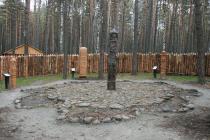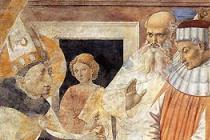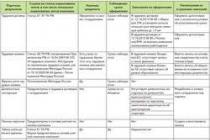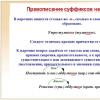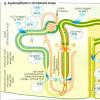1. Simple Present / Present Continuous
1. Every Monday, Sally (drive) ............... her kids to football practice. 2. Usually, I (work) ............... as a secretary at ABT, but this summer I (study) .............. .. French at a language school in Paris. That is why I am in Paris. 3. Shhhhh! Be quiet! John (sleep) ......... 4. Don"t forget to take your umbrella. It (rain) ............. 5. I hate living in Seattle because it (rain, always) ............ 6. I"m sorry I can"t hear what you (say) ................ .... because everyone (talk) ................ so loudly. 7. Justin (write, currently) ............ a book about his adventures in Tibet. I hope he can find a good publisher when he is finished. 8. Do you want to come over for dinner tonight. Oh, I"m sorry, I can"t. I (go) ... ........ to a movie tonight with some friends. 9. The business cards (be, normally)................ printed by a company in New York. Their prices (be)................. inexpensive, yet the quality of their work is quite good. 10. This delicious chocolate (be) ........ .......... made by a small chocolatier in Zurich, Switzerland.
2. Present Perfect / Present Perfect Continuous
1.Robin: I think the waiter (forget) ................. us. We (wait)....... here for over half an hour and nobody (take) ........ our order yet.
Michele: I think you"re right. He (walk) ..... by us at least twenty times. He probably thinks we (order, already) .........
Robin: Look at that couple over there, they (be, only) ..... here for five or ten minutes and they already have their food.
Michele: He must realize we (order, not) .... yet! We (sit) .... here for over half an hour staring at him. Robin: I don"t know if he (notice, even) ............ He (run)............. from table to table taking orders and serving food.
Michele: That's true, and he (look, not) ................ in our direction once.
3. Present tenses (Simple, Continuous, Perfect or Perfect Continuous).
This (be) Mr Smith.
He (be) a dentist.
He (work) in this hospital for 10 years.
It (be) 7 p.m. and he just (come) home.
What he (do) now? He (cook) dinner for his wife. It (be) her birthday.
They (live) together for 15 years. I think they (be) very happy.
4. Correct the mistakes.
Have you ever been to London?
They haven’t got dinner at 7 o’clock.
I don’t never drink coffee in the morning.
What's your telephone number?
We are going to play chess this afternoon.
This computer was made by Japan.
She is a bank manager, doesn’t she?
They come in Italy.
I’m preferring to buy clothes in boutiques.
How much cheese do you add in this dish?
We talked when the telephone rang.
Do you ever try weird food?
She has finished cooking before we came.
How many dollars do you spend a week?
Who does play the violin?
5. Translate from Russian into English.
1) They have been moving to a new apartment for a month now.
2) Has dad come home from work yet? - Not yet.
3) What's the matter? Why is the baby crying?
4) What are you looking for? - I'm looking for a textbook.
5) I have known Nancy for a long time. We have been working together for 10 years.
6) Mrs. Smith is walking now. She loves to walk in rainy weather.
7) It’s cold now, it’s snowing. It always snows at this time of year.
8) Mary hasn’t been with us since last week. Now I've been waiting for her for 2 hours.
9) Have you already sent Jim a telegram? - Yes.
10) Tom knows a lot of songs. Now he is singing an English folk song.
11) When are you leaving? - Me today, and Nora tomorrow.
12) Where is Professor Black? - He's in his office. He is preparing for tomorrow's lecture. He usually works at this time.
13) How long have you been playing the piano? – I’ve been playing it since childhood. And Mary hasn't played the piano for 3 years.
14) Do you see Dr. Smith? He is standing by the window.
15) He just called, he doesn’t know anything.
16) The rain has stopped, but a strong wind is still blowing.
17) This week, none of the students in our group missed a single lesson.
18) Where is Mary? – She’s in the kitchen, preparing dinner. - She cooks well? - She is an excellent cook.
19) I hear footsteps. Someone is coming. No one at home. I'm afraid of strangers.
20) Quietly, students are taking exams. - But it’s April. Students always take exams in June.
21) Lisa is a girl of six years old. Now she is playing with toys. Usually girls play with dolls. Lisa doesn't like dolls. She's been playing with the teddy bear for an hour now. She just broke her typewriter.
Exercises to consolidate Present Simple Tense
Exercise 1. Open the brackets using verbs in the Present Simple.
My working day (begin) at 7 o’clock. I (get) up and (do) my morning exercises. It (take) me fifteen minutes. At half past seven we (have) breakfast. My father and I (leave) home at 8 o’clock. He (take) a bus to his factory. My mother (be) a doctor, she (leave) home at 9 o’clock. In the evening we (gather) together in the living room. We (watch) TV and (talk).
(USUALLY) 1. My sister (to get) up at eight o'clock. 2. She (to be) a school-girl. She (to go) to school in the afternoon. 3. Jane (to be) fond of sports. She (to do) her morning exercises every day. 4. For breakfast she (to have) two eggs, a sandwich and a cup of tea. 5. After breakfast she (to go) to school. 6. It (to take) him two hours to do his homework. 7. She (to speak) French well. 8, My working day (to begin) at seven o"clock. I (to get) up, (to switch) on the radio and (to do) my morning exercises. It (to take) me fifteen minutes, At half past seven we (to have) breakfast. My father and I (to leave) home at eight o"clock. He (to take) a bus to his office. My mother (to be) a doctor, she (to leave) home at nine o"clock. In the evening we (to gather) in the living-room. We (to watch) TV and (to talk).
Exercise 2. Educate negative form .
1. He goes to school every day.
2. My sister works here.
3. They eat a lot.
4. We work every day.
5. I come from Ukraine.
6. He comes from Germany.
7. They live in the USA.
8. He plays football every day.
9. I visit my parents very often.
10. His father works at an office.
11. She gets up at seven o’clock.
12. They play tennis very often.
13. We go to the cinema on Saturdays.
14. He wants to become a pilot.
15. My brother watches television every night.
16. I read newspaper every day.
17. Her father finishes his work at six o’clock.
18. Nick goes to bed at nine.
19. He goes to school by bus.
20. We skate once a week in winter.
Exercise 3. Translate into English using verbs in the Present Simple.
1. I'm working.
2. We are working.
3. They don't work.
4. Are you working? - Yes.
5. Does it work? - No. He is studying.
6. My brother doesn't study. He works.
7. My sister doesn't read books.
8. Our grandmother likes to sleep on the sofa.
9. Do you like to relax in a chair?
10. We eat and drink in the kitchen.
11. My brother doesn't like to read newspapers.
12. We sleep in the bedroom.
13. My brother sleeps on the sofa in the living room.
14. My sister gets dressed in front of the mirror.
15. My uncle writes books.
16. We write exercises at school.
Exercises For consolidation Present Progressive Tense
Exercises 1. Open the brackets using verbs in the Present Progressive . ( NOW )
1.My book (to lie) on the table.
2. They (to work).
3. The doctor and her patient (to talk).
4. We (to cook) dinner. My mother (to make) a salad.
5. A young man (to drive) a car. He (to listen) music.
6. My grandfather (to read) a book.
7. The pen (to lie) on the floor.
8. You (to have) a break?
9. She still (to sing).
10. The boys (to run) about in the garden.
11. I (to do) my homework.
12. John and hisfriends (to go) to the library.
13. Ann (to sit) at her desk. She (to study) geography.
14. A youngman (to stand) at the window. He (to smoke) a cigarette.
15. The old man (to walk) about the room.
16. The dog (to lie) on the floor.
17. You (to have) a break?
18. What language do you (to study)?
19. Who (to lie) on the sofa?
20. What do they (to talk) about?
21. It still (to rain).
Exercises 2. Translate into English and open the brackets using verbs in the Present
Progressive
. (NOW)
1.We are writing. 2. They don't read. 3. She doesn't work. 4. Are you watching? 5. He doesn't read. 6. They don't play the piano. 7. I don't bake a cake. 8. She doesn't sing. 9. Her sister is not sleeping. 10. Grandma doesn’t drink tea? 11. Do your friends drink coffee? 12. She works at the table. 13. I am writing a letter. 14. I'm doing an exercise. 15. Boys don't swim in the pool. 16. Do they play football? 17. My sister is washing the floor. 18. My friend helps her child. 19. Are you helping dad? 20. Pupils read an interesting story.21. They are reading a book. 21. She goes to school. 22. Do they read? 23. Does your grandmother eat candy? 24. John is preparing dinner. 25. Bill is running in the park.
1. I'm reading. 2. He doesn't write. 3. We are not working. 4. Are you reading? 5. Is he sleeping? 6. Nick and Mike are playing football. 7. Kate plays the piano. 8. She doesn't sing. 9. My sister is sleeping. 10. Does dad drink tea? 11. Do your parents drink tea? 12. I don't sleep. 13. She is sitting at the table. 14. We are doing an exercise. 15. We don't swim. 16. Do they play in the yard? 17. Nina and Ann are washing the floor. 18. Nick helps his mother. 19. Are you helping dad? 20. My sister is reading an interesting book. 21. They are going to school. 22. Are you going to school? 23. Does it work? 24. Your grandmother is going to the store? 25. He buys sweets. 26. What is your sister doing? 27. Where do children play? 28. Why are you laughing? 29. Where are they going? 30. What are these boys carrying?
Exercises for consolidation Present Perfect Tense
Exercise 1. Connect the parts of the sentence from the right and left columns of the table.
Lots of things have happened
did you just arrive?
Hello, have
film I've ever seen.
He has never
for three years.
It's the most boring
since I last wrote to you.
I haven't smoked
driven a car before.
Exercise 2. Put the words in the correct order to form a sentence.
first / driven / this / is / the / a / he / has / time / car
ever/caviar? / you / have / eaten
me / hasn’t / to / nearly / written / for / month / Jill / a
it / raining / has / yet? / stopped
Exercise 3. Solve 5 tests (only one answer is correct).
1. … you … all the invitation cards to your friends yet? Why are they still on the table?
a) have not/send
b) haven’t/sent
c) hadn't/sent
d) had/send
2. Shall I wait for her until she… . Yes, only when she returns you can go home.
a) has come
b) have come
c) coming
d) comes
3. … you … good friends since childhood or you … friends recently?
a) had been/had made
b) have been/have made
c) have been/have made
d) were/made
4. She... just graduated from university. I wonder what she's going to do next.
a) has
b) have
c) was
d) were
5. We...a nice jacket today. There's a clearance sale ( full sale ) on the corner.
a) had bought
b) has bought
c) bought
d) have bought
Hello friends! Present Simple Tense is one of the most commonly used tenses. The Present Simple tense denotes action in the present in the broadest sense of the word.
It is used to denote habitual, regularly repeated or constant actions, for example when we talk about someone's habits, daily routine, schedule, etc., i.e.
Present Simple denotes actions that are happening at the present time, but are not tied specifically to the moment of speech.
Exercise 1.
- One fly___________ (to fly), two flies _____________ (to fly).
- One girl _____________ (to cry), four girls _____________ (to cry).
- When a wolf _____________ (to see) the moon, it _____________ (to begin) to howl (howl).
- Wolves and sheep _____________ (to be) never friends.
- Our hens _____________ (to lay [put aside]) a lot of eggs.
- Boys _____________ (to fight) and___________ (to shout).
- That boy _____________ (to try) to catch some balls.
- These girls _____________ (to try) to run away from an angry turkey.
- If one goose _____________ (to have) one tooth, how many teeth _____________ (to have) thirteen geese?
Exercise 2. Open the brackets using verbs in the Present Simple.
1. Alice (to have) a sister.
2. Her sister’s name (to be) Ann.
3. Ann (to be) a student.
4. She (to get) up at seven o’clock.
5. She (to go) to the institute in the morning.
6. Jane (to be) fond of sports.
7. She (to do) her morning exercises every day.
8. For breakfast she (to have) two eggs, a sandwich and a cup of tea.
9. After breakfast she (to go) to the institute.
10. Sometimes she (to take) a bus.
11. It (to take) her an hour and a half to do her homework.
12. She (to speak) English well.
13. Her friends usually (to call) her at about 8 o’clock.
14. Ann (to take) a shower before going to bed.
15. She (to go) to bed at 11 p.m. m.
Exercise 3. Form negative and interrogative forms of sentences.
1. I visit my parents very often.
2. They live in Great Britain.
3. He goes to school by bus.
4. She lives in this house.
5. He wants to be a doctor.
6. They play tennis every Sunday.
7. We work every day.
8. My sister goes to bed at nine.
9. Usually I have dinner very late.
10. My brother watches TV every evening.
11. She likes classical music.
12. We go to the theater once a month.
Exercise 4. Open the brackets using verbs in the Present Simple.
1. My working day (to begin) at seven o’clock.
2. I (not to walk) to work every morning.
3. She (to do) her morning exercises every day.
4. He (to speak) German.
5. I (to visit) my friend every week.
6. Her first class (to start) at eight o’clock.
7. Ann (not to read) a lot.
8. He always (to invite) his friends to his birthday party.
9. I (to go) for a walk every day.
10. She (to wash) her car once a week.
Exercise 5.
1. She's busy. (to be busy)
2. I'm not busy.
3. Are you busy?
4. Are they at home? (to be at home)
5. He is not at home.
6. I don't know.
7. Do they know?
8. She doesn't know.
9. Who knows?
10. Nobody knows.
11. Does he read English books? (to read English books)
12. They never read. (never / to read)
13. Does she have an apartment? (to have a flat)
14. He has nothing.
15. Who is this?
Exercise 6. Translate into English:
1. I am a student. I am at school.
2. My brother is an artist. He is not an engineer.
________________________________________________________________
3. My sister is at work. She is a doctor.
________________________________________________________________
4. He is a student.
________________________________________________________________
5. Are you a student? - No, I am a doctor.
________________________________________________________________
6. My sister is at home.
________________________________________________________________
7. We are not at school. We're home.
________________________________________________________________
8. My brother is a student. He is at school.
________________________________________________________________
9. Is your mother at home? - No she is at work.
________________________________________________________________
10. Is your cousin at home? - No, he's at school. He's a student.
________________________________________________________________
11. Is your sister a teacher? - No, she is a student.
________________________________________________________________
12. Is your dad at work? - No, he's at home.
________________________________________________________________
13. Is your sister a designer? - Yes, - Is she at home? - No she is at work.
________________________________________________________________
14. My grandfather is a scientist.
________________________________________________________________
15. My mother is not a teacher. She is a doctor.

Answers to exercises
Exercise 1.
1 flies/fly
2 cries/cries
3 sees/begins
4 are
5 lay
6 fight/shout
7 tries
8 try
9 has/have
Exercise 2.
1 - has
2 - is
3 - is
4 - gets
5 - goes
6 - is
7 – does
8 - has
9 - goes
10 - takes
11 - takes
12 - speaks
13 - call
14 - takes
15 – goes
Exercise 3.
1. Do I visit…? I do not (=don’t) visit…
2. Do they live...? They do not (=don’t) live…
3. Does he go...? He does not (=doesn’t) go ...
4. Does she live...? She does not (=doesn’t) live…
5. Does he want...? He does not (=doesn’t) want …
6. Do they play...? They do not (=don’t) play ...
7. Do we work...? We do not (=don’t) work…
8. Does my sister go...? My sister does not (doesn’t) go …
9. Do I usually have dinner...? Usually I do not (=don’t) have dinner…
10. Does my brother watch...? My brother does not (doesn’t) watch …
11. Does she like...? She does not (=doesn’t) like ...
12. Do we go...? We do not (=don’t) go…
Exercise 4.
1.begins
2. do not (=don’t) walk
3.does
4.speaks
5.visit
6. starts
7. does not (=doesn’t) read
8. invites
9. go
10 washes
Exercise 5.
1 – She is busy
2 – I am not busy
3 – Are you busy?
4 – Are they at home?
5 – He is not at home
6 – I don’t know
7 – Do they know?
8 – She doesn’t know
9 – Who knows?
10 – No one (=Nobody) knows
11 – Does he read English books?
12 – They never read
13 – Does she have a flat?
14 – He doesn’t have anything (=He has nothing)
15 – Who is it?
Exercise 6.
1. I am a pupil. I am at school.
2. My brother is a painter. He is not an engineer.
3. My sister is at work. She is a doctor.
4. He is a student.
5. Are you a student? – No, I am a doctor.
6. My sister is at home.
7. We are not at school. We are at home.
8. My brother is a pupil. He is at school.
9. Is your mother at home? – No, she is at work.
10. Is your cousin at home? – No, he is at school. He is a pupil.
11. Is your sister a teacher? – No, she is a student.
12. Is your father at work? – No, he is at home.
13. Is your sister a designer? – Yes. – Is she at home? – No, she is at work.
14. My grandfather is a scientist.
15. My mother is not a teacher. She is a doctor.
For those who dig deeper and want to know more - Our Youtube channel
PRESENT SIMPLE. Lots of exercises
To arrive, to give, to play, to understand, to blow, to prepare, to wash, to fall, to miss, to run, to know, to talk, to open, to do, to water, to teach, to iron , to brush, to pay, to say, to remember, to show, to speak, to gather.
Answers: Given, understood, blown, fallen, run, known, done, taught, paid, said, shown, spoken.
Exercise 2. Choose the correct option.
- I have/has watched this film.
- We have began/begun the work.
- Den have/has done his homework.
- Molly has break/broken her toy
- Julia and Betty have/has cut the vegetables.
- He/we have paid for pizza.
- You have/has ironed this dress.
- Children have has/had supper.
- I/she have switched off the light.
- Martin has went/gone.
- The girl has drew/drawn a nice picture.
- You/he has returned from the trip.
- They have/has gathered the harvest.
- She/they has packed the things.
- We have chose/chosen the present.
- The train have/has arrived.
Answers: 1. have; 2. begun; 3.has; 4.broken; 5. have; 6.we; 7. have; 8. had; 9.I; 10. gone; 11. drawn; 12. he; 13. have; 14.She; 15.chosen; 16. has.
Exercise 3. Make up sentences using the Present Perfect.
- We/to return/from the journey/just.
- I/to see/my boss/today.
- Helen/to decorate/her room/already.
- My cousins/to be/to this cinema/never.
- Max/to buy/a magazine/today.
- You/to spend/a lot of money/this month.
- Ian and Peter/to repair/the radio/already.
- I/to drive/a car/never.
- We/to get/some letters/this week.
- The dog/to run away/just.


Answers: 1. have written. 2. has helped. 3.have learned. 4. has told. 5. has been swept. 6.has put. 7. have eaten. 8. have drunk. 9. has brought. 10. have put. 11. have had. 12. has taken. 13. have put on. 14. has made. 15. has opened. 16. have bought. 17. has ordered. 18. have looked. 19. have you recorded. 20. have translated.
Translation: 1. The students wrote a dictation. 2. My friend helped me solve a difficult problem. 3. I learned the poem. 4. She told them an interesting story. 5. Katya swept the floor. 6. The waiter put a bottle of lemonade in front of him. 7. I had breakfast. 8. We drank water. 9. He brought them meat and vegetables. 10. You put the dishes on the table. 11. They drank tea. 12. She removed the dirty plates from the table. 13. The children put on their coats. 14. Suzanne made herself a dress for her birthday. 15. She opened the box of chocolates. 16. I bought milk for a milkshake. 17. James ordered a bottle of apple juice. 18. We looked for more CDs with good music. 19. Did you record your favorite movie on his VCR? 20. I translated a difficult article from German into Russian.
Exercise 5. Make negative sentences from these sentences.
- She has found a wallet on the road.
- We have tidied our country house.
- The weather has changed.
- Liz has left you a note.
- They have moved to another hotel.
- I have caught a big fish.
- Pupils have learned this poem.
- Mike has booked the tickets for us.
- The plane has landed.
- The doctor has prescribed some medicine.

Answers: 1. She hasn’t found a wallet on the road. 2.We haven’t tidied our cottage house. 3.The weather hasn’t changed. 4. Liz hasn’t left you a note. 5.They haven’t moved to another hotel. 6. I haven’t caught a big fish. 7. Pupils haven’t learned this poem. 8. Mike hasn’t booked the tickets for us. 9. The plane hasn’t landed. 10. The doctor hasn’t prescribed some medicine.
Exercise 6. Make interrogative sentences from these sentences.
- We have been to the theater.
- I have painted the walls in my bedroom.
- Richard has turned on the radio.
- They have explained this rule to me.
- Amy and Ron have gone to play tennis.
- Molly has made a cup of tea.
- His parents have gone to the market.
- Nelly has typed three letters.
- The parrot has flown away.
- The students have prepared for the exams.


Answers: 1. Why has he stopped. 2. My cousin is looking, he hasn’t found. 3. It has been. 4. What are you studying. 5. They have just given you a pay rise. 6. She is knitting. 7. Have you only had, you haven’t eaten. 8. People are planting. 9. Are you going. 10. Johnny, who has finally found, is giving. 11. How long have you been. 2. Have you seen. 13. What are you looking for? 14. Nancy is looking. 15. She is going, she is not going. 16. Has Mike left. 17. Have they paid. 18. How long have you known. 19. Your car is making. 20. The boy has done, is taking. 21. I am having. 22. Jay has never traveled. 23. We have always had. 24. Larry has never owned.
Exercise 8. Open the brackets using verbs in the Present Perfect or Past Simple.
- It (to be) very cold yesterday.
- When you (to meet) him?
- I (not to see) him since 1997.
- How many mushrooms you (to gather)?
- Where you (to put) the newspaper? I want to read it, but cannot find it anywhere.
- The new school (to begin) working last year.
- At last I (to do) all my homework: now I shall go out.
- The building of the house (to begin) early in April.
- The rain (to stop) but a cold wind is still blowing.
- We already (to solve) the problem.
- He (to come) a moment ago.
- I never (to speak) to him.
- He just (to finish) his work.
- You (to make) any spelling mistakes in your dictation?
- What books do you (to read) when you (to live) in the country?
- They (not yet to come) from the south.
- He (to be) ill last week, but now he (to recover).
- If everyone (to read) this new novel, let’s discuss it.
- You (to book) tickets? - Yes, I… . I (to book) them several days ago.
- I can hardly recognize you. I (not to see) you since you (to leave) for Moscow. And you (to change) so much.
- You (to read) all the books on this shelf?
- I (not to see) my cousin since last year.
- Why you (to put) these things in the wrong place?
- Why do you (to leave) the door open? You will catch cold sitting in the draft.
- “We (not to meet) for such a long time!” said my friend. “Yes, indeed,” I answered, “and we both (to grow).”

Answers: 1. it was. 2. When did you meet. 3. I have not seen. 4. Have you gathered. 5. Where have you put. 6. The new school began working. 7. I have done. 8. The building of the house began. 9. The rain has stopped. 10. We have already solved. 11. He came. 12. I have never spoken. 13. He has just finished. 14. Have you done. 15. What books did you read, you lived. 16. They have not yet come. 17. He was, he has recovered. 18. Everybody has read. 19. Have you booked, I have, I booked 20. I have not seen, you left, you have changed. 21. Have you read. 22. I have not seen. 23. Why have you put. 24. Why have you left. 25. We have not met, we both have grown.
WELL DONE!
Literature:
- Pavlichenko O.M. English language. Grammar workshop. Level II. - 2nd ed., rev. and additional - X.: Ranok, 2012. - 304 p.
- Golitsynsky Yu.B. Grammar: Collection of exercises. - 5th ed., - St. Petersburg: KARO, 2005. - 544 p. - (English for schoolchildren).
– an important part of grammar and a stumbling block for beginners. In order not to get confused about tenses, just studying the theory is enough; you need to consolidate your knowledge with the help of exercises. These tenses exercises in English will help you better understand one of the main topics.
If you want to work on the times until they become automatic, I recommend paying attention to the exercise I talk about in this video. And don't forget to subscribe to my channel! 🙂
Exercise 1. Verb in Present Simple
In this exercise you need to put the verb into one of the forms. Let me remind you that there are only two such forms: a verb in the initial form and a verb with the ending -s.
Show answers with translation
- He has some sugar. - He has some sugar.
- Jacob and Tina have a lot in common. – Jacob and Tina have a lot in common.
- I do not keep expired pills. – I don’t keep expired pills.
- He runs the company with his brother. – He runs the company with his brother.
- She does not like my job. – She doesn’t like my work.
- Do you know how it works? – Do you know how it works?
- Cats never miss a chance to sleep. – Cats never miss an opportunity to sleep.
Exercise 2. Irregular verbs
Show answers with translation
- My uncle walks two miles every day and feels very well. “My uncle walks two miles a day and feels very good.”
- We really need another vacation. “We really need another vacation.”
- Sorry, I can’t talk now, I amrunning to see the doctor at the moment. - Sorry, I can’t talk right now, I’m running to see a doctor right now.
- My dad always says that I should find another job. – My dad always says that it’s better for me to find another job.
- Take an umbrella, it is going to rain. - Take an umbrella, it will rain soon.
- I added some pepper to the soup, now it smells better. – I added a little pepper to the soup, now it smells better.
Exercise 5. Simple or Continuous tenses?
This is an exercise for all times Simple and Continous. Open the brackets and put the verb into one of the forms:
Show answers with translation
1. You will be safe now. “You will be safe now.”
2. Yesterday I found a coin in the garden. It looked very old. – Yesterday I found a coin in the garden. She looked very old.
3. Jake was watching TV when someone knocked on the door. – Jake was watching TV when someone knocked on the door.
4. Life is like a box of chocolates. You never know what are you are going to get. – Life is like a box of chocolates. You never know what you'll get.
5. We were just talking about you! – We were just talking about you!
6. I can’t pick you up from the school today, because I will be working in the evening. Mom will pick you up.– I can’t pick you up at school today because I’ll be at work in the evening. Mom will come pick you up.
Exercise 6. Past Simple or Present Perfect?
Exercise 7. Past Perfect and Future Perfect tenses
More often found in fiction than in colloquial speech. used rarely both in oral and written speech. Do you know when these tenses are used?
Select the correct translation option.
Exercise 8. Tenses in English
In this task you need to open the brackets and put the verb into a tense form that is appropriate in meaning. Pay attention to the translation to understand which verb tense is best.
Show answers with translation
- Jane loves cakes and hates broccoli. Jane loves cakes and hates broccoli.
- I was listening to the lecturer carefully but understood nothing. – I listened carefully to the lecturer, but did not understand anything.
- Oh, I'm glad to see you! I have been waiting for you all day! - Oh, I'm glad to see you! I've been waiting for you all day.
- When the rescue team found the lost tourists, they had been living with no food for two days. – When rescuers found the missing tourists, they had already lived for two days without food.
- I had warned you many times but you didn’t listen. – I warned you many times, but you didn’t listen.
- By the end of the next year, we will have produced two million tons of soap. – By the end of next year we will produce two million tons of soap.
- I have seen a lot in my life but this… this is unbelievable. “I’ve seen a lot in my life, but this... this is incredible.”
- No, tomorrow morning I will be (am) busy. I will be playing (am playing) football with my kids. - No, I'll be busy tomorrow morning. I will play football with the children.



